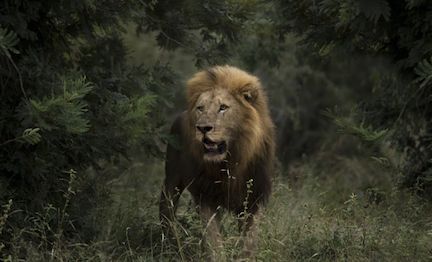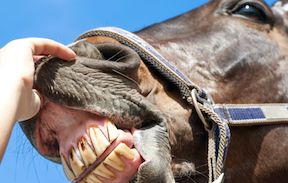Things Are Not As They Appear
In a dense forest where sunlight struggled to penetrate the towering canopy, a young boy found himself on the edge of a great adventure. With wide eyes and a racing heart, he marveled at the grandeur of nature surrounding him. The mysterious sounds of rustling leaves and distant animal calls added an air of excitement to his journey.
As he ventured deeper into the bush, a peculiar sensation began to tickle his senses. His imagination ran wild, fueled by whispered tales of mythical creatures lurking within these very woods. Anxiety started to take hold, making his steps more hesitant and his breathing increasingly shallow.
Suddenly, a distant rumble shook the forest, echoing through the trees. The ground beneath him trembled, intensifying his fear. Heart pounding, he strained his eyes to discern the source of the commotion.
In a clearing just ahead, bathed in dappled sunlight, a majestic figure emerged. The boy's breath caught in his throat as he believed he saw a mighty lion prowling through the tall grass. Its golden mane shimmered in the light, and its fierce gaze seemed to pierce through his trembling form.

Fear engulfed him as his mind raced with thoughts of the lion's razor-sharp claws and powerful jaws. His survival instinct kicked in, urging him to find safety. He crouched behind a gnarled tree trunk, his eyes fixed on the awe-inspiring yet terrifying sight.
But as his panic subsided, a peculiar realization dawned upon him. The mighty lion, which had initially appeared so daunting, was not what it seemed. Its golden mane turned out to be nothing more than the interplay of sunlight and leaves, and the fierce gaze transformed into gentle curiosity.
Peering closer, he noticed the lion's paws, once menacing, were but piles of delicate, velvety petals. Its growl, which had sent shivers down his spine, was nothing more than distant thunder sending ripples of tremors through the trees and underbrush.
That fearsome lion, the sight of which had conjured such fear and foreboding, was merely an illustion.
The boy was now free to see with eyes of awe rather than eyes of fear. Instead of a menacing roar, he now heard the purring harmony of the forest's symphony. With newfound courage and a heart filled with gratitude, he continued his journey through the forest, embarking on further adventures with a discerning eye and an open mind. The boy who thought he saw a lion in a moment of fear had learned that the world, when seen through the lens of courage and understanding, was full of wonders beyond his wildest imagination.
In the Bible, there are numerous instances where things are not as they appear, and moments of fear test the faith and courage of individuals. These stories highlight the importance of discernment, trust, and seeking understanding beyond initial appearances.
For example, in the story of David and Goliath, the Israelites faced a giant warrior named Goliath, who struck fear into the hearts of the people. However, David, a young shepherd boy, saw beyond Goliath's intimidating appearance. He trusted in God's strength and defeated Goliath with a single stone. He learned to not to judge a situation based on outward appearances, but to rely on God's guidance and strength in times of fear and uncertainty.
When we trust in God's guidance, and seek understanding even in moments of fear and uncertainty, we can navigate challenges with faith, discernment, and the assurance that God's truth will prevail.
"Trust in the LORD with all your heart, And lean not on your own understanding; In all your ways acknowledge Him, And He shall direct your paths" (Proverbs 3:5-6)
Buy Truth
Years ago, many people were very dependent upon horses for transportation and farm work. Horses were expensive, and so the buyer needed to make sure the new horse was in good health. If the horse was sick, the success of the farm could be in jeopardy.
Prospective horse buyers would examine the animal's teeth. The condition of the teeth was a reliable way to determine the age and overall health of the horse. This examination helped protect the buyer from buying a bad horse.

Instead of taking the time to examine something, we could choose to go fishing, spend time with friends, or watch TV. Choosing to examine something costs us the pleasure of doing something else.
Proverbs 23:23 instructs us to "Buy truth and do not sell it...."
One way to "buy" truth is to "spend" time seeking truth and examining something before we believe it.
Buying the truth has nothing to do with spending money. Poor people can buy as much truth as rich people. Buying truth has to do with the effort required to find and acquire the truth.
1 Thessalonians 5:21 instructs us to, "Examine everything and hold fast to that which is good."
Examination takes work, time, and mental energy. In essence, this is how we buy truth or pay for the truth. No monetary cost, but a cost nonetheless.
Use Your Head to Find Your Car
"Next time you're wandering through a vast parking lot, looking for your car," reports VOX.com, "there's a weird strategy you can try: hold your remote unlocking device up to your head."
It might sound pretty crazy, but it will actually extend the device's range a bit — perhaps causing your car to light up, letting you more easily find it.
We were skeptical too, but a few physicists have actually conducted some experiments that prove it's true.
Holding the device up to your head means that its signal — electromagnetic waves of a particular frequency — passes through a large number of water molecules, contained in your brain. As these waves pass through, they pull the positive charges present in the water (the hydrogen ions) in one direction, and the negative charges (the oxygen ions) in the other.
"In effect, you've got the protons being pulled upward, then downward, then upward, then downward, because of the oscillating electric field," Bowley says. "That means they're behaving rather like a radio aerial antenna — as they go up and down, they're radiating energy."
That energy is radiated at the same frequency as the original signal, so it can combine with it to extend its range a bit further before it dissipates. As a result, in the video, Bowley can walk outside the normal range of his device, hold it up to his head, and get his car to unlock.
He demonstrates that it's the water in his brain that's crucial by walking even farther from his car and holding the device up to a jug of water — and again, successfully unlocking it.
Click the link to source above to view a video demonstration by Professor Roger Bowley of the UK's University of Nottingham.
Apparently, there are more ways to use your head than you realized! But the best way remains the pursuit of wisdom.
"Getting wisdom is the wisest thing you can do! And whatever else you do, develop good judgment" (Proverbs 4:7, NLT).